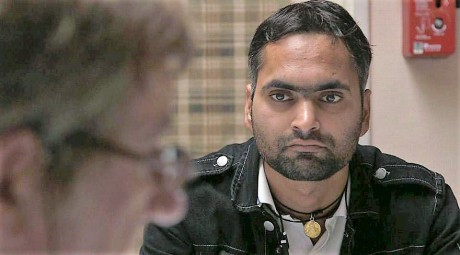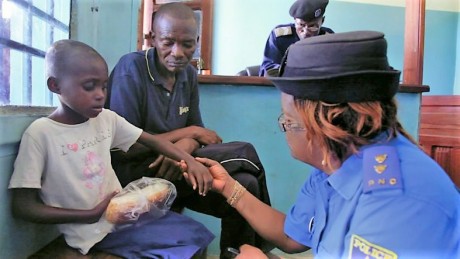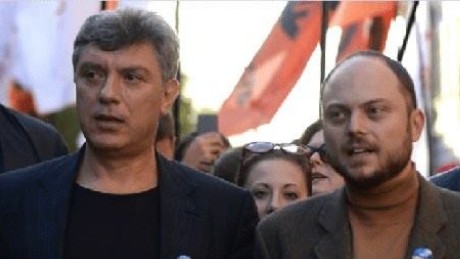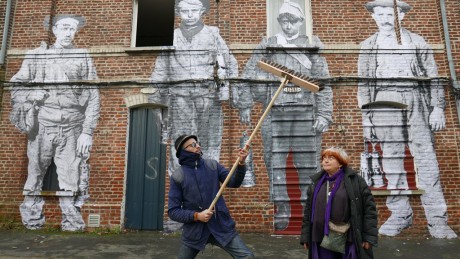DIEUDO HAMADI: MAMA COLONEL / MAMAN COLONELLE
How do you ensure law, order and justice in a country that is deeply marked by decades of war and conflict? This award-winning Congolese documentary follows police officer Honorine Munyole, called Mama Colonel, a widow and mother of four. She fights an tireless struggle for women and children in a society where the police are facing cases of rape, witchcraft and child abuse – and where the men bear the visible scars after the war and are therefore seen as the primary victims. The film is a Danish premiere:
THUR 22/02 TO-DAY ! 16:30
Maman colonelle / Dieudo Hamadi, 2017, 72 min. / Eng. subtitles / 122 min. incl. debate. Postdoc at DIIS Peer Schouten and Professor at the Nordic Africa Institute in Uppsala Maria Eriksson Baaz talk about their field work in DR Congo and discuss the challenges of building civilian institutions in a war-torn country. The debate is in English. (Docs & Talks programme)
KOMMENTAR
Det mishandlede barn har scenen der det fattige sted, hvor politichefen Honorine Munyole med sine folk er kommet til stede for at gribe ind, redde børn og kvinder fra vold og vanrøgt. Hun udspørger barnet, som står i en gruppe naboer, andre børn og tilskuere, og barnet fortæller sin forfærdende historie. Og så er det kameraet ser tåren begynde at pible frem og glide ned ad kinden og blive til én mere, blive til flere, og kameraet holder fast, og barnet fortæller, giver sig ikke hen i gråden, mærker den ikke, fornemmer ikke fugten i øjet, på kinden.
Men jeg mærker den, og filmfotografen både mærker og ser den og mærker og ser samtidig handlingen i hele scenen, og i rette sekund drejer han sit kamera, og jeg ser, at de personer, som lytter med omkring, at de også græder, stille og uden at mærke det. Et sandt øjeblik findes nu i en film, som vil blive bygget af kun sande øjeblikke.
Politichefen er heller ikke i tvivl, hun ser i dette sit lands ulykke. Hun er af regeringen sat i spidsen for en specialenhed, som skal blotlægge og reparere følgerne af Den Anden Congokrig (1998-2003), hvis uoverskuelige grusomhed var ufattelig, hvis ulykker stadigvæk ingen ende vil tage. Honorine Munyole hedder hun, Maman Colonelle kaldes hun der på stedet. Hun skal tage sig af børn som er mishandlet, kvinder som er voldtaget, mishandling og voldtægt gang på gang. Filmen følger hende på arbejde, Dieudo Hamadis kamera er altid rigtigt placeret – sådan opleves det – det er med hele tiden, nær og total, scene efter scene, begivenhed efter begivenhed, rystende historier blandet med historier om indsatser, som ændrer forholdene, skaber freden.
Dieudo Hamadi skriver med sin nye film endnu et kapitel af sit lands historie, han gør det i én uafbrudt åndeløs montage af disse optagelser, som hver for sig rummer fortællingen, som tilsammen bliver en hvileløs beretning, hvor jeg selv ser alt, forstår alt. Om tåren på kinden. Den Anden Congokrig er en kompliceret affære med utallige detaljer. Hamidis filmkunst kan på sin måde rumme hele den virkelighed i ét autentisk billede, i én montage af disse billeder det ene efter det andet. Uden indklip.
Og jeg tænker lige nu, at Chris Marker ikke har ret, at cinéma vérité alligevel findes der midt i filmkunsten. Tåren på en kvindes kind i en biografs mørke, hvor hun ser en film om en kvindes lidelse og død. Som Marker selv, som Godard, som Dreyer, som Pontecorvo laver Hamadi mesterlig sand film om krigen, om historien, om det udsatte menneske. Sådan set er al sand film dokumentar. Maman Colonelle er et sådant mesterværk.
RESUMÉ
Hvordan sikrer man lov, orden og retfærdighed i et land, der er dybt mærket af årtiers krige og konflikter? Denne prisvindende congolesiske dokumentarfilm følger politiofficer Honorine Munyole, kaldet Mama Colonel, enke og mor til fire. Hun kæmper en utrættelig kamp for kvinder og børn i et samfund, hvor politiet står over for sager om voldtægt, heksebørn og børnemishandling – og hvor mændene bærer de synlige ar efter krigen og derfor bliver set som de primære ofre. Filmen er en danmarkspremiere.
Postdoc ved DIIS Peer Schouten og professor ved Nordisk Afrika Institut i Uppsala Maria Eriksson Baaz fortæller om deres feltarbejde i DR Congo og diskuterer udfordringerne med at opbygge civile institutioner i et krigshærget land. Moderator er antropolog og filminstruktør Camilla Nielsson. Debatten foregår på engelsk. Billetpris: 95/65 kr.
TORS 22/02 I DAG ! 16:30
Maman colonelle / Dieudo Hamadi, 2017, 72 min. / eng. tekst / 122 min. inkl. debat (Docs & Talks program)
LINKS
http://www.lemonde.fr/culture/article/2015/04/02/dieudo-hamadi-un-cineaste-a-la-courbe-du-fleuve_4608019_3246.html (om instruktøren)
https://www.hollywoodreporter.com/review/mama-colonel-berlin-2017-976870 (god anmeldelse)
https://da.wikipedia.org/wiki/Afrikanske_Verdenskrig (kort nødvendig historisk oversigt)






